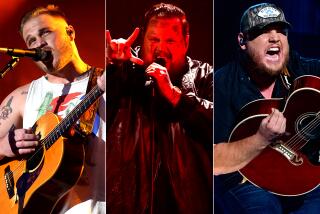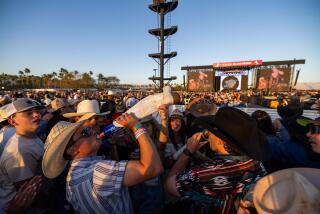Stagecoach debut goes family route
INDIO — The most adorable girl at Stagecoach, the two-day “country Coachella” fest that premiered Saturday here at the Empire Polo Club, sat on her date’s shoulders while Alan Jackson played. She tossed her blond hair and smiled every time the video cameras turned toward her. “It’s all right to be little-bitty,” sang Jackson in his cozy baritone, performing a Tom T. Hall song about the modern-day poor in spirit. The girl, like the others the camera singled out, sang along. At the song’s end, she raised her hands high and stuck out her tongue.
This quintessential sweetheart of Stagecoach was probably 4 years old.
Everywhere on the grounds where just last weekend Coachella’s tattooed dance mavens and neo-punkers got their freak on, moms pushed strollers, grade-schoolers held cartwheel contests and dads bought root beer floats. There was beer drinking and modest hell-raising too, but even the younger adults unencumbered by offspring fit into the family mood.
If Coachella offers a bohemian escape fantasy — where rules, musical or otherwise, don’t apply — Stagecoach is the county fair, a loving intergenerational gathering where rules might be bent in the name of fun, but tradition is respected.
The top-notch talent scattered across four stages (five, if you count the Half-Pint Hootenanny, where tot music standouts such as “Farmer” Jason Ringenberg entertained), took on country music’s customs with varying degrees of loyalty. Smaller stages presented elders including bluegrass great Earl Scruggs; preservationists such as the cowboy artists whose twang filled the Mustang Tent; classicists such as the great singer Raul Malo; and a few stubborn innovators such as Lucinda Williams and Neko Case. The big Mane Stage showed a more proscribed range of approaches within mainstream country.
At one end of that spectrum were headliners Jackson and George Strait, who’ve reinvigorated country’s lineage without rocking it too hard. These stars artfully commercialize revered subgenres such as honky-tonk and Western swing in songs that subtly update the music’s mythology of cowboys (or truck drivers), cheating, sin and church.
At the other end are newcomers such as Miranda Lambert and Eric Church, who grew up with “pot-smoking parents” (Church did, anyway, he said) and classic country-rock. Burning up the Mane Stage in midafternoon, these promising artists embodied country’s latest future by refusing to make any distinction between it and rock, as a music or a lifestyle.
The 23-year-old Lambert, whose second album, “Crazy Ex-Girlfriend,” came out last week, modifies the rocker-chick archetype, emphasizing earthiness instead of glamour. Like her better-known peer Gretchen Wilson, Lambert writes about being tough and a bit dangerous, burning rubber and waving guns around. Her persona is sweeter than her lyrics; that mix of wholesomeness and hazard makes her music fresh.
Wearing door-knocker earrings that Lily Allen would have envied and sometimes playing a pink electric guitar, Lambert presented herself as a smart, likable woman with just enough of a bad streak to help her stay free. She gave a shout-out to Strait and Jackson, and also covered songs by Creedence Clearwater Revival and the Band with convincing grit. Her originals split the difference between these influences.
Church covered a Band song too, though a little less gracefully than Lambert. He looked just as much the hipster, projecting a scruffy bravado Brandon Flowers of the Killers would kill for. But his voice is hard country, reminiscent of Merle Haggard, without much of a rock edge.
Church’s songwriting updates country’s typical tales of ordinary disaster by telling them in the voice of a modern-day screw-up — dubiously employed, a mix of a slacker and a caveman, but somehow charming beneath the trucker cap. Guys like this believe as firmly in arena rock as in country. Church’s band constantly invoked air-guitar classics; his set’s climax was a medley of several, including “Black Betty” by Ram Jam and “Cat Scratch Fever” by Ted Nugent, interpolated into Church’s own biggest hit, “How ‘Bout You?”
For Church and Lambert (and, in varying ways, fellow main-stagers Sara Evans and Jason Michael Carroll), it’s not a novelty to incorporate rock or to emulate its culture of small rebellions. It’s just as much a traditional move as George Strait makes invoking Western swing king Bob Wills.
Stagecoach will continue to confront these changes in country as its planners seek the common ground between purism and commerciality, preservationism and the future. How can it serve the genre’s family values while still finding its innovative edge? The festival’s successful first day indicated that the best plan may be not to sweat the questions too much. In that, its role model is Willie Nelson, whose early evening side-stage set drew a huge crowd delighted to celebrate the old master.
Nelson has always considered “tradition” a flexible term, borrowing as he pleases from jazz, blues and rock as well as country, and marking every song choice with his indelible stamp. He’s uncategorizable — not such a common thing in country. But its newest stars indicate that uncategorizable might be coming back into fashion. That would be good for country, and for Stagecoach.
ann.powers@latimes.com
More to Read
The biggest entertainment stories
Get our big stories about Hollywood, film, television, music, arts, culture and more right in your inbox as soon as they publish.
You may occasionally receive promotional content from the Los Angeles Times.










